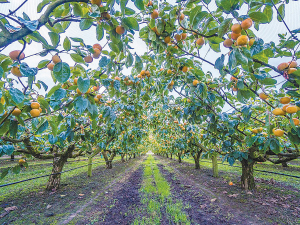Persimmons hit supermarket shelves
Harvesting is underway of one of New Zealand’s rarest and most unusual fruit - persimmons.
 Persimmon Industry Council manager Ian Turk says it's a relatively new fruit and the domestic market has been growing. About half of persimmons grown in NZ - 1300 tonnes - are exported.
Persimmon Industry Council manager Ian Turk says it's a relatively new fruit and the domestic market has been growing. About half of persimmons grown in NZ - 1300 tonnes - are exported.
Have you tried a persimmon? Chances are you haven’t. The Persimmon Industry Council believes many people haven’t tried the unique fruit, only available for six short weeks from late April through to early June.
Persimmons are as big and colourful as an orange, shaped like a tomato and can be eaten like an apple.
Council manager Ian Turk says persimmons have been grown commercially in NZ since the 1980s when the Fuyu variety was introduced.
“Prior to then persimmons were grown in home gardens, but these were an astringent variety which needed to be very soft before eating, to reduce tannin levels,” he told Hort News.
About half of persimmons grown in NZ - 1300 tonnes - are exported. On why persimmons haven’t taken off in NZ, Turk says it’s a relatively new fruit and the domestic market has been growing.
“But with the industry’s focus on growing for export, most of the commercial production has been sent to export markets.
“So, in New Zealand, has not been well known, or well supplied.”
Turk adds that the fruit is becoming more well known and the local market has really taken off over the last three or four years.
“But there’s still a lot of people who haven’t tried one.”
His message to people is to go and buy one or two persimmons.
“I’m pretty sure it’s a taste experience you’ll be glad you took the punt and tried,” he says.
Persimmons are an ancient fruit extremely popular in Asia.
“Some New Zealanders might remember having a tree in their backyard of an old variety of persimmons that were astringent, so they had a lot of tannins in them. They had to be really overripe and mushy before you could enjoy them,” says Turk.
 |
|---|
|
Ian Turk |
“But now we grow a modern variety called Fuyu which you can eat like an apple. It’s nice and sweet and crisp. Just slice it into wedges and eat them that way. As it ripens, the unique persimmon flavour comes through more strongly.”
When buying persimmons in the supermarket, look for a good orange colour and firm skin.
“You want them while they’re still hard and crisp and then if you like them a bit softer, they’ll ripen in your fruit bowl over the next few days,” says Turk.
The Persimmon Industry Council is focused on growing for export. The council has about 30 grower members, two thirds in Gisborne, three in North Auckland and one each in Waikato and Northland. All grow the fruit for export. The biggest markets for NZ persimmon last year were Australia, Thailand, Canada, Hong Kong, Singapore and Vietnam.
Turk says there are some other growers who supply domestic market only.
“We have a small group of growers and exporters with good demand for our product. We see that the industry will show modest growth, particularly from within the existing growers who have knowledge and experience with growing persimmons for export.”
Healthy and Nutritious
5+ A Day has lots of persimmon recipes online including roast persimmon breakfast bowls, persimmon kūmara and ginger soup, persimmon feta and rocket salad and persimmon tart with mandarin glaze.
While persimmons are mostly eaten as fresh fruit, they can be added to smoothies, baking or salads.
5+ A Day trustee and principal scientist and team leader at Plant and Food Research, Dr Carolyn Lister, says persimmons contain important nutrients and plant compounds including flavonoids and carotenoids which can positively affect your health.
“They are technically a berry and are a good source of vitamin C and a source of dietary fibre and potassium. Eating a wide range of fresh fruit and vegetables – and trying new things such as persimmons – is the best way to help maintain a healthy body weight, boost brain function and protect your heart health.
“As we head into winter, we can support our immune systems by eating fruit high in vitamin C and all New Zealanders should be looking to eat two pieces of fruit a day as part of a healthy balanced diet. Persimmons have one of the shortest supply windows of any fruit, so make the most of them while you can.”
Generally, in the season flush they retail around $6 to $10/kg.
Fruit trader Seeka posted a record profit and returns to shareholders in 2025.
Recent weather events in the Bay of Plenty, Gisborne/Tairawhiti, and Canterbury have been declared a medium-scale adverse event.
DairyNZ's chief executive Campbell Parker says the 2024/25 dairy season reinforces the importance of the dairy sector to New Zealand.
A New Zealand agribusiness helping to turn a long-standing animal welfare and waste issue into a high-value protein stream has won the Australian dairy sector's top innovator award.
OPINION: A bumper season all around.
Dairy Women's Network (DWN) has announced that Taranaki dairy farmer Nicola Bryant will join its Trust Board as an Associate Trustee.

OPINION: A mate of yours truly reckons rural Manawatu families are the latest to suffer under what he calls the…
OPINION: If old Winston Peters thinks building trade relations with new nations, such as India, isn't a necessary investment in…